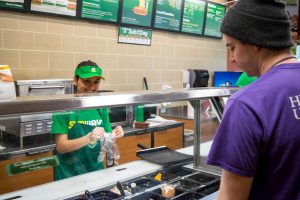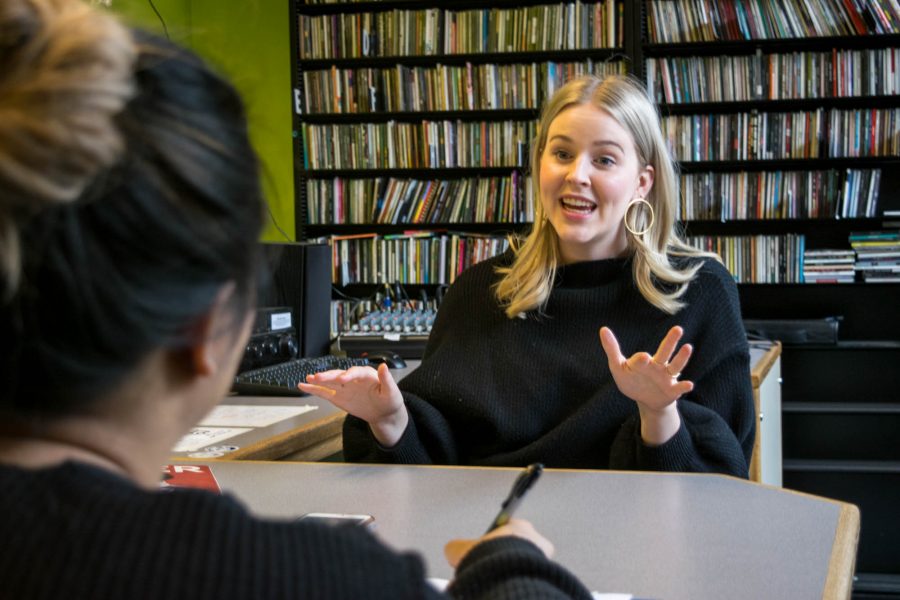By Jenn Tran | Staff Reporter
After one chemistry class her freshman year, senior Kristina Hamilton quickly changed her mind about studying nutritional science, becoming a language arts integrated studies major instead.
She had always loved English, but after taking Dr. Suzanne Wolfe’s Literature and Faith course, she officially decided it was the direction she wanted to go in.
“I’m leaning towards teaching middle school language arts, just because I love English so much, and those were my favorite classes,” she said.
Hamilton at first did not want to work with children due to her experiences of working at horse camps in Hawaii, but after finding employment at the Little Gym in Seattle, she decided that it was exactly what she wanted to do.
Although graduate school is not what she considers her “cup of tea,” after graduation Hamilton plans to stay in the Seattle area and get her teaching certification while working at a job with kids on the side. Once she obtains her certification, she will then look for work as a teacher.
Hamilton looks to stay in Seattle for the first year solely because she wants to be able to experience the city outside of the “SPU bubble.”
“I feel like everywhere I go, I’m weighed down with ‘Alright, now I need to go back and study,’ but being able to experience and explore outside of that will be really great,” she added.
The most helpful resource Hamilton has found within her time here has been the relationships and advice she has received from her professors.
“So many of my professors have shared their own experiences with me about teaching elementary and middle schools, writing and publishing on their own. Just a lot of hearing their perspectives and also pushing me as a writer,” she said
In addition to teaching, Hamilton plans to write short works in the genre of poetry, short essays and articles.
As the countdown to graduation on June 9 draws near, Hamilton and other graduating seniors reflect back on their four years at SPU, reminiscing on what they will miss and what they believe can be improved for the future.
Moving forward, while Hamilton values the knowledge and friendships she has gained at school, she hopes that in years to come SPU will improve on creating more interactions between the residency halls collectively. She believes that her two years of dorm residency, and year of working at the Unicom desk, were the primary source of her connections to different people in the community.
“The dorms seem to exist separately; it’d be nice to see more overlap in that community,” she said.
The Falcon’s former news editor Manola Secaira said she most enjoyed working for The Falcon because it “fed into my major.” she believed it was an experience she could bring with her. She describes journalism as something you should “have experience in before you get experience.”
Aside from news production, she recalls the popularity of discussions about race and how it operated in today’s society during her junior year, and how other college campuses were talking about it.
“It was really intense. I appreciated that because as someone who grew up in a community without a lot of latinas like me, it gave me a chance to understand why that’s actually problematic in some ways, or at least in the way I was raised,” she said.
The support group Secaira found from those discussions gave her the opportunity to be in a healthy environment, and to re-explore what her culture means to her and what she wants it to look like as a second generation Guatemalan.
“I was always interested in telling stories and reading literature all the time in class, in bed, etc.,” she explained, but was “limited to what I had in the library, what people recommended to me: a lot non-Latinx.”
Secaira states that although she loves “that literature,” being consciously introduced to Latinx literature this year was really interesting because she had always know the classics, but seeing what
Latinx literature that looks like contemporarily was a different story.
“Also seeing stories written by authors that grew up similar to me, seeing that they came to the U.S. and had to grapple with that same conflicts that I find myself grappling with, that was really refreshing,” she said.
Latinx Literature with Dr. Yelena Bailey is at the top Secaira’s list of favourite courses taken at SPU.
If Secaira could change anything regarding her time at SPU, she would increase the lack of Latinx community on campus.
“When I first came, it was really underdeveloped. I found a very big disconnect. [There are] not many latinas or latinos on campus. I had found my community outside of school. I know that it’s been growing here, but fostering and developing is important,” she stated

Manola Secaira currently works at Subway, but wants to intern at either the Huffington Post, New York Magazine or High Country News Magazine in the future.
Secaira would also like for SPU to offer more literature classes similar to Latinx Literature and Multi-Ethnic Literature.
“The fact that the ethnic literature classes were taught by white professors was insane to me. It was such a big difference taking a literature class from a POC,” she said.
Although Bailey isn’t a latina, “it’s the fact we can get a different perspective, and she acknowledged that we needed to see a different perspective,” Secaira added.
She says that it was a “big deal” for her because she has only had two professors that were POC during her four years at SPU.
“I was aware of what I didn’t have, but it reminded me that it would have been really cool to have had that perspective earlier on,” she says.
She emphasized that a difference of perspective is important because when one perspective is deemed “more valued” or showed more than the others, it can be a “really big issue with the way we we understand things,” especially in literature.
“Literature is a worldly thing. Please increase diversity in staff,” she said
After graduation, Secaira hopes to intern at either Huffington Post, New York Magazine or High Country News Magazine, focusing on environment and immigration.
Senior KSPU station director Judith Feenstra, on the other hand, plans on attending a publishing program in graduate school at the University of Washington after leaving SPU.
Initially from Phoenix, Arizona, Feenstra came to SPU because she wanted to attend a Christian college.
“SPU offered a lot of the progressive liberal things that I wanted coming out of a christian school,” she said. “Arizona is a pretty conservative state; Seattle offered a lot of those things whilst still offering the religious aspect of the school.”
After her first visit to Seattle, she visited her favorite music label based in Seattle and quickly became infatuated with how the city revolved around music.
“People think of Seattle as the punk or grunge city, but it isn’t really that anymore,” she said. “I also was sick of the sun and never wanted to see it again.”
However, Feenstra did not enjoy the city of Seattle her first two years.
“I thought this place wasn’t for me: this weather is terrible, nobody talks to each other here. It was just really foreign to me, the freeze, it really bugged me,” she said
Then she began her internship at Sub Pop Records in downtown Seattle her junior year, and became very close to the people there.
“There was a magic around that moment where I realized Seattle wasn’t all that bad. Also, the first time I spent a summer here, I realized that Seattle summers are amazing. Junior year was the year I realized I’m where I’m meant to be,” she added.
Feenstra does, however, strongly believe that SPU as an institution needs to offer more hands-on experience, less theory.
“More liberal arts majors don’t get a lot of hands on experience of what it’s like to work in that field; it’s more abstract theory. A lot of majors, like art history or communications or even art design, get a little,” she said.
Feenstra finds value in opportunities to be in an office and interact with people who work in those fields. She wishes that SPU would offer more hands on learning rather than “random” job fairs. But the biggest takeaway, she thinks, is how personally you get to know the professors on campus.
“I have seen that as a massive benefit to my education here,” she said, adding that she has been able to walk into a professor’s office for an hour and talk about her “next steps, strengths and weaknesses.”
Those relationships gave her the opportunity to take feedback and “channel [the feedback] directly into my goals outside of school that I wouldn’t have been able to do at a bigger university,” she said. “Those relationships have really shaped the directions I’ve found myself going into.”
One such relationship is with Dr. Luke Reinsma, who taught Feenstra’s favorite class: Literature, Beginnings through Milton.
“Dr. Reinsma is the most incredible man I’ve ever met, he is the sweetest. He’s like Merlin the wizard in Arthurian context, he has beautiful white hair and mustache. He made the whole class cry like 10 times because he moved us to tears, he was just so encouraging and so insightful, and very poetic,” she said. “It was my favorite class because of him.”
Feenstra strongly advises for incoming first years to ask older students who their favourite professors are.
“Walk up to a senior you don’t know and ask them who their favorite professors are for prerequisite classes because I picked mine randomly,” she said. Although she says she got “pretty lucky with most of them,” she believes she missed out on a handful of professors that people raved about.
“I kind of missed out on getting to have a relationship with them,” she said.
With the knowledge she has now, 20-year-old Hamilton would agree and advise her freshman self not to sacrifice who she is for the sake of pleasing other people, and advises incoming freshman to take the time to connect with their professors.
“There are so many cool professors who want to connect with students, hear your stories, and answer any questions you have,” she said















































































